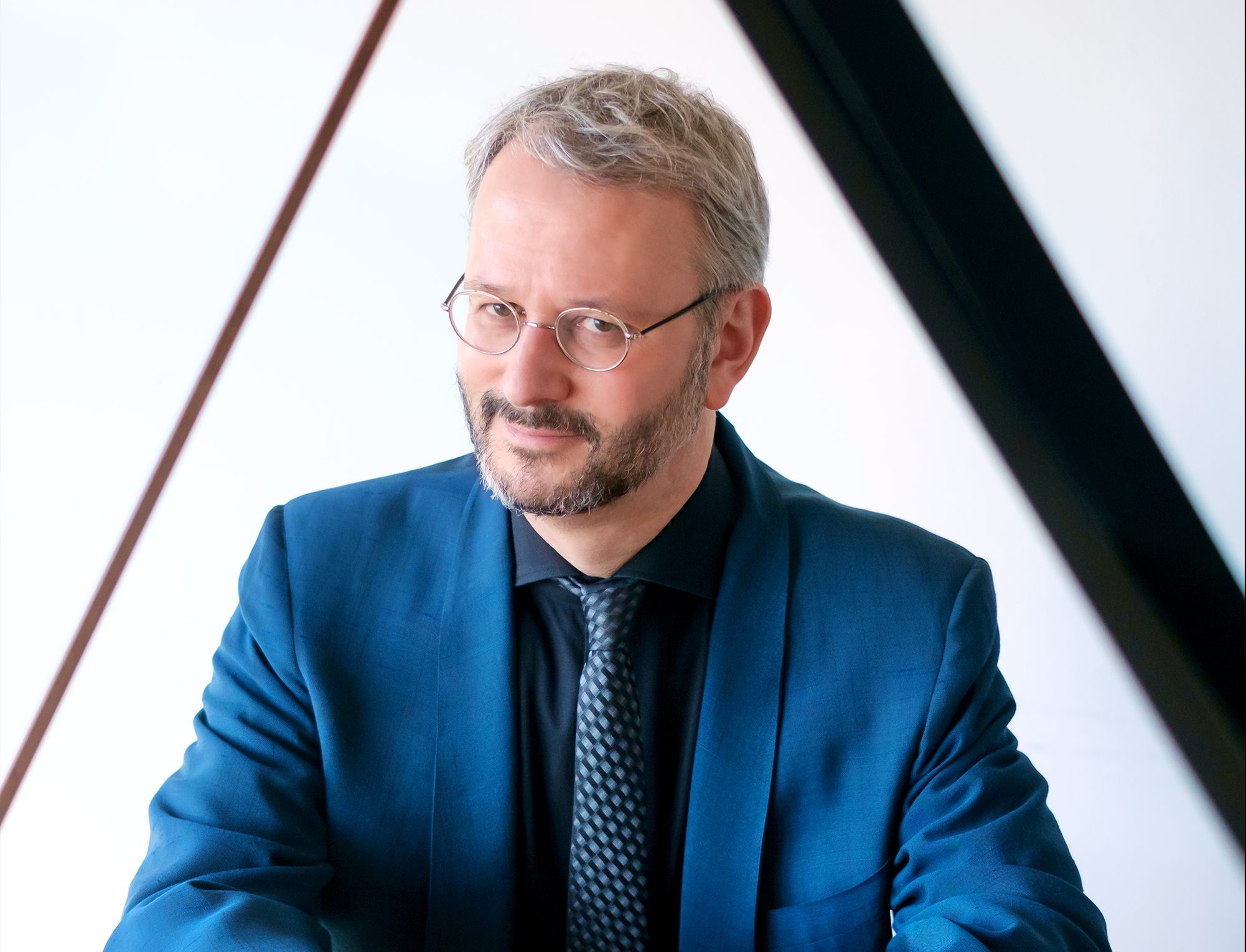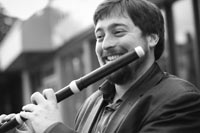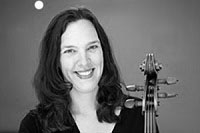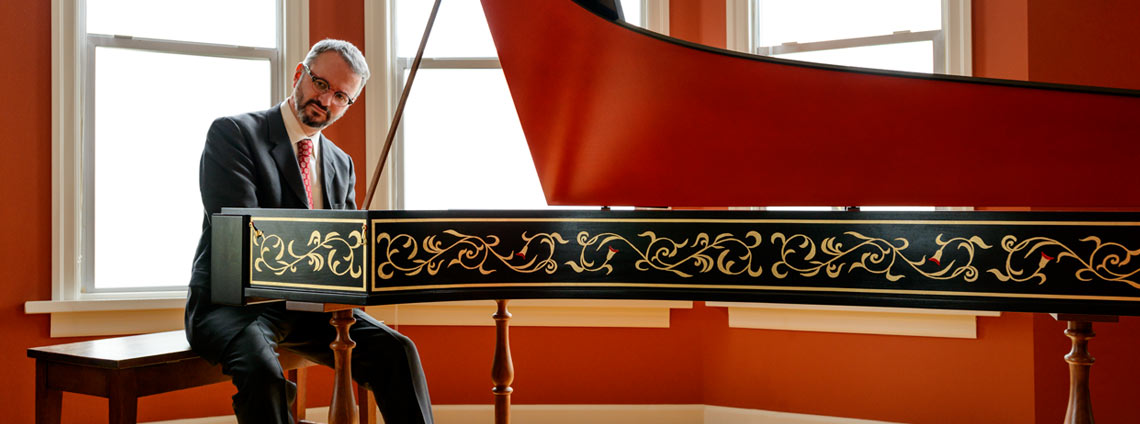The Vancouver Playhouse | Map
Byron Schenkman; Ingrid Matthews; Joshua Romatowski; Elisabeth Reed
Byron Schenkman (harpsichord)
Ingrid Matthews (violin)
Joshua Romatowski (flute)
Elisabeth Reed (viol)
An evening of delights from the trend-setting courts of Louis XIV and Louis XV, from the refined elegance of Couperin and Marais to the irresistible flamboyance of Duphly and Rameau.
“Byron Schenkman & Friends display dashing musicianship.” – The Seattle Times
Programme
Michel Blavet
Sonata in G Major, op. 2, no. 1, for flute and continuo
Adagio – Allegro – Arias I and II (L’Henriette) – Presto
Antione and Jean-Baptiste Forqueray
Chaconne in G (La Buisson) for bass viol and continuo
Marin Marais
Passacaille in E Minor from Pièces en trio for flute, violin, and continuo
François Couperin
Troisième Concert Royal for harpsichord, flute, violin, bass viol, and continuo
Prélude – Allemande – Courante – Sarabande – Gavotte – Muzette — Chaconne
INTERVAL
Jean-Pierre Guignon
Sonata in G Minor, op. 1, no. 12, for violin and continuo
Vivace – Allegro ma poco – Largo staccato – Tambourin: Presto – Allegro
Jacques DuPhly
Chaconne in F for harpsichord
Jean-Philippe Rameau
Troisième Concert for harpsichord, flute, violin, and bass viol
La Lapopliniere – La Timide – Tambourins
PROGRAMME NOTES
Louis XIV was at the height of his power when he decided to move the seat of French government from Paris to Versailles in 1682. The hunting lodge which he converted into a magnificent palace became the envy of all Europe. The palace, its gardens, and especially the music composed there, were widely imitated. Bach’s suites, Handel’s operas and oratorios, and Purcell’s music for the theatre, are just a few great examples of work which could not have existed without the influence of Versailles and its music.
It is not clear which the “Sun King” loved more: dancing or having absolute power. In any case he found a way to combine his two passions by commissioning spectacular opera-ballets which served as propaganda pieces for the monarchy. Sometimes he even cast himself as the Sun-God Apollo. He also commissioned music for his private entertainment, including trios for the ceremonies of dressing him and putting him to bed. Marais, Couperin, and the elder Forqueray were among the many great musicians who provided music for such occasions.
Louis XIV ruled at Versailles until his death in 1715 when he was succeeded by his great-grandson Louis XV. The younger Louis lived his entire life at Versailles. Although the effectiveness of Louis XV as a political leader has been questioned by historians, it is generally agreed that French culture and art reached a high point during his reign. Blavet, DuPhly, Guignon, and Rameau are just four of the many wonderful French composers who flourished during this period.
– Byron Schenkman, October 2015

Byron Schenkman
Byron Schenkman has recorded more than thirty CDs of 17th– and 18th-century repertoire, including recordings on historical instruments from the National Music Museum, Vermillion, and the Museum of Fine Arts, Boston. A recipient of the Erwin Bodky Award from the Cambridge Society for Early Music “for outstanding achievement in the field of early music,” he was voted “Best Classical Instrumentalist” by the readers of Seattle Weekly, and his piano playing has been described in The New York Times as “sparkling,” “elegant,” and “insightful.”
He has been a featured guest with the Chameleon Arts Ensemble of Boston, the Daedalus Quartet, Les Enfants d’Orphée, the Northwest Sinfonietta, Pacific Baroque Orchestra, Philharmonia Northwest, and the Portland Baroque Orchestra. He was also founding co-director of the Seattle Baroque Orchestra with violinist Ingrid Matthews. In 2013, he launched Byron Schenkman & Friends, a Baroque and Classical chamber music series at Benaroya Hall in Seattle. Schenkman is a graduate of the New England Conservatory and received his master’s degree with honors in performance from the Indiana University School of Music. He currently teaches at Seattle University and has been a guest lecturer in harpsichord and fortepiano at Indiana University.

Ingrid Matthews
Ingrid Matthews has long been established as one of the leading baroque violinists of her generation. She founded the Seattle Baroque Orchestra with Byron Schenkman in 1992, and served as Music Director until stepping down from that position in 2013.
Matthews won first prize in the 1989 Erwin Bodky International Competition for Early Music, and since that time has performed extensively around the world with numerous period-instrument ensembles. She has served as concertmaster for orchestras such as the New York Collegium, the Boston Early Music Festival Orchestra, and Musica Angelica (Los Angeles); and has appeared as a guest director and soloist with many others including the New York Collegium, the Australian Brandenburg Orchestra, the Magnolia Baroque Festival Orchestra (Winston-Salem, NC), New Trinity Baroque (Atlanta), the Bach Sinfonia (Washington DC), Les Idees Heureuses (Montreal), the Indianapolis Baroque Orchestra, and the Victoria Symphony. For close to a decade she was first violinist of the ensemble La Luna, which specialized in 17th-century music, touring and recording to great critical acclaim.
Matthews has won international critical acclaim for a discography ranging from the earliest solo violin repertoire through the Sonatas and Partitas of J.S. Bach. The latter recording was named by Third Ear’s Classical Music Listening Companion as “the finest complete set of these works,” and the critic for American Record Guide writes “this superb recording is my top recommendation for this music… on either modern or period instruments.” Ingrid Matthews is currently on the faculty of Cornish College of the Arts in Seattle. She is a graduate of Indiana University, where she studied with Josef Gingold and Stanley Ritchie.
Ingrid Matthews is also known as Ingrid Matthews Olson. A passionate life-long interest in the visual arts has led her to amass an eclectic training in various techniques, and her paintings have been shown in group and solo exhibitions in Seattle and elsewhere.

Joshua Romatowski
Joshua Romatowski is a versatile performing artist in the Seattle area. Joshua’s playing has been described as “elegantly shaped” (San Francisco Examiner) “with graceful intimacy” (San Francisco Classical Voice). Joshua holds a Master of Music in Flute Performance from the San Francisco Conservatory of Music and a Bachelor of Music in Flute Performance from the University of Texas at Austin, as well as an Artist Diploma in Early Music from the Cornish College of the Arts.
Joshua has appeared with the Detroit Symphony Orchestra, Ukiah Symphony Orchestra, Philharmonia Healdsburg, and the St. Claire Shores Symphony. In 2014, Joshua placed 3rd in the Seattle Flute Society Young Artist Competition and was a winner of the Ladies Musical Club of Seattle Frances Walton Competition.
Joshua is also an accomplished baroque flute performer. Winner of the 2012 San Francisco Conservatory of Music Baroque Concerto Competition, Joshua performed C.P.E. Bach’s Concerto for Flute and Orchestra in D Minor on baroque flute with the SFCM Baroque Ensemble. Joshua has performed in San Diego with the Pacific Bach Project and in San Francisco with MUSA, the Alchemy Trio and the Albany Consort. In 2014, Joshua was one of the selected winners of the Early Music America summer workshop scholarships. Joshua has participated in the American Bach Soloists Summer Academy in 2013 and 2014, and the Vancouver Early Music Festival in 2014. During the past season Joshua appeared with the American Bach Soloists (San Francisco), Queen City Musicians (Seattle), MUSA (San Francisco), Agave Baroque (Los Angeles), Portland Baroque Orchestra (Portland), and the Byron Schenkman and Friends (Seattle) concert series. On baroque flute, Joshua has received lessons from Janet See, Sandra Miller, Wilbert Hazelzet, Stephen Schultz, Philippe Allaine-Dupre, and Greer Ellison.

Elisabeth Reed
Elisabeth Reed teaches viola da gamba and Baroque cello at the San Francisco Conservatory of Music, where she is also co-director of the Baroque Ensemble. Recent teaching highlights include master classes at the Juilliard School, the Shanghai Conservatory and Middle School, and the Royal Academy of Music. Her playing has been described as, “intense, graceful, suffused with heat and vigor” and “delicately nuanced and powerful” (Seattle Times). A soloist and chamber musician with Voices of Music, Archetti, Pacific Musicworks, and Wildcat Viols, she has also appeared with the Smithsonian Chamber Players, the Seattle, Portland, Pacific, and Philharmonia Baroque Orchestras, and the American Bach Soloists. She has performed at the Boston Early Music Festival, the Berkeley Early Music Festival, the Ohai Festival, the Whidbey Island Music Festival, and the San Luis Obispo Mozart Festival. She can be heard on the Virgin Classics, Naxos, Focus, Plectra, and Magnatunes recording labels and has many HD videos on the Voices of Music Youtube channel. She also teaches viola da gamba and Baroque cello at the University of California at Berkeley. She is a Guild-certified practitioner of the Feldenkrais Method of Awareness Through Movement, with a focus on working with musicians and performers.


